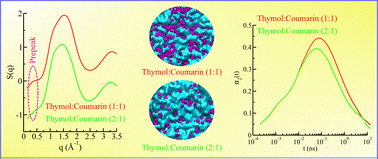Origin of structural and dynamic heterogeneity in thymol and coumarin-based hydrophobic deep eutectic solvents as revealed by molecular dynamics†
Abstract
Hydrophobic deep eutectic solvents (HDESs) have recently emerged as a class of water-immiscible solvents with greener starting materials and inherent hydrophobic character, opening the gates to various new promising applications. Herein, we have carried out all-atom molecular dynamics simulations to comprehend the bulk phase structural organization and dynamic behavior of thymol and coumarin-based HDESs at two molar ratios of the constituent components. The simulated X-ray and neutron scattering structure functions (S(q)s) indicate a prepeak signifying that these HDESs possess nanoscale heterogeneity or intermediate range ordering. The decomposition of the total S(q)s based on polarity reveals that clustering of the polar group present in thymol and coumarin leads to the presence of the prepeak which also has small contributions from the apolar–apolar correlations. The intermolecular hydrogen bonding network between thymol–coumarin and thymol–thymol mainly guides the arrangement of the HDESs. We find a stronger hydrogen bond between the carbonyl oxygen of coumarin and the hydroxyl hydrogen of thymol, marked by the longer hydrogen bond lifetime. In contrast, the shorter lifetime of the hydrogen bond between the hydroxyl oxygen and the hydroxyl hydrogen of thymol suggests a weaker hydrogen bonding. On changing the thymol : coumarin molar ratio from 1 : 1 to 2 : 1, the average lifetimes of both the hydrogen bonds decrease, suggesting stronger hydrogen bonds in the 1 : 1 HDES. The translational dynamics of thymol and coumarin become faster in the 2 : 1 thymol : coumarin HDES. A slightly stronger caging effect is observed for coumarin in comparison to thymol molecules. From the analysis of the non-Gaussian parameter, we observe the presence of heterogeneity in the translational displacements of thymol and coumarin molecules. Furthermore, the computed self-van Hove correlation functions reveal that thymol and coumarin molecules cover more distances than the ideal diffusive displacements, confirming the presence of dynamic heterogeneity.



 Please wait while we load your content...
Please wait while we load your content...